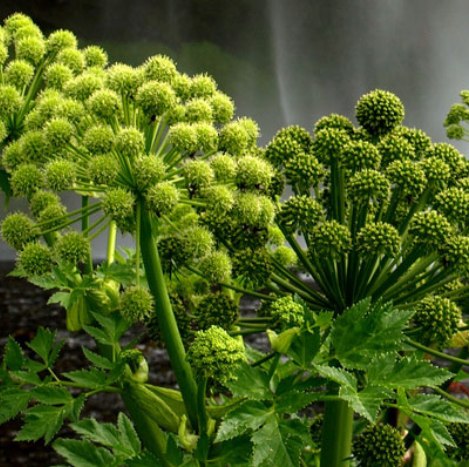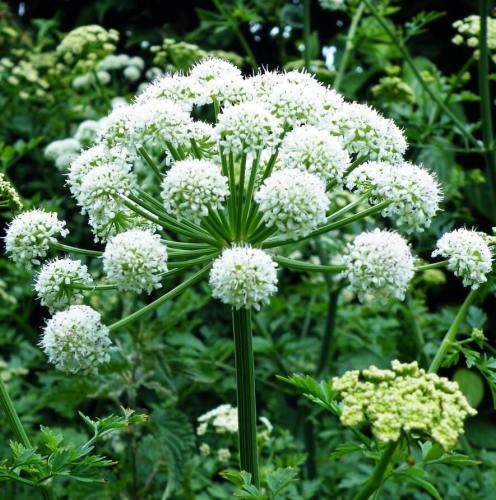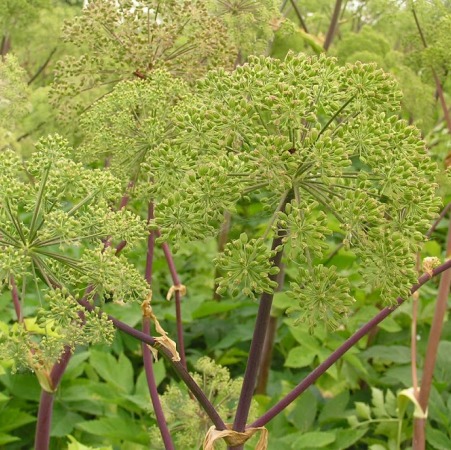


Botanical name Angelica archangelica L.
Botanical synonyms Archangelica officinalis Hoffm., and Archangelica officinalis var. himalaica
Family Apiaceae (Umbelliferae)
Source Roots
Origin India
Processing Method Steam Distillation
CAS Number 8019-54-3
Color/Consistency Light yellow to orange-brown viscous liquid with
Aroma Musky, earthy, peppery, woody, herbaceous, spicy
Blends With Patchouli, sandalwood, clary sage, vetiver, frankincense, cedarwood, neroli, petitgrain, lemongrass, orange, lime, lemon, mandarin, bergamot and grapefruit.
Product Abstract
Angelica Root Oil is a frontrunner according to the early herbalists because of its stimulating and sedative properties. Its relaxant effect solidifies it as a potent digestive. It also supports detoxification processes and used for assisting a healthy respiratory function.
History
Angelica Root Oil has been used for rituals, purification and against infections for many years. This oil comprises of an extensive therapeutic repertoire that enables it to enrich and rejuvenate the body. It assists in both winter wellness and vitality while enhancing energy levels. It is being used since the Middle Ages as a natural restorative or health tonic.
Harvesting/Extraction Information
The oil is extracted from the roots, rhizome and seeds through the process of steam distillation.
Common Usage
Caution
Dilute before use; for external use only. May cause skin irritation in some individuals; a skin test is recommended prior to use. Contact with eyes should be avoided.
Key constituents
b-Phellandrene 10.0–24.0%
a-Pinene 4.4–24.0%
a-Phellandrene 7.5–20.0%
(þ)-Limonene 6.0–13.2%
d-3-Carene 4.5–13.0%
p-Cymene 3.5–9.8%
b-Myrcene 1.6–5.5%
(E)-b-Ocimene 2.4–4.9%
Pentadecanolide 0.4–2.4%
Terpinolene 0.7–2.2%
(Z)-b-Ocimene 1.0–1.9%
a-Copaene 0–1.9%
Camphene 0.2–1.3%
Sabinene 0.4–1.2%
b-Pinene 0.2–1.2%
a-Muurolene 0–1.2%
Safety Summary
Hazards Phototoxicity.
Contraindications (dermal) If applied to the skin at over maximum use level, skin must not be exposed to sunlight or sunbed rays for 12 hours.
Maximum dermal use level 0.8% to avoid phototoxicity.
Organ-Specific Effects
Adverse skin reactions Undiluted angelica root oil was not irritating to rabbit ormouse skin; tested at 1%on 25 volunteers it was neither irritating nor sensitizing. In a modified Draize procedure on guinea pigs, angelica root oil was non-sensitizing when used at 1% in the challenge phase. In a study of 200 consecutive dermatitis patients, two (1%) were sensitive to 2% angelica root oil on patch testing.
Autoxidation products of (þ)-limonene, a-pinene and d-3-carene can cause skin sensitization. In phototoxicity tests, distinct positive results were obtained with concentrations of 100%, 50%, 25%, 12.5%, 6.25% and 3.125%. A doubtful reaction was obtained with 1.56%, and a negative result with 0.8%
Systemic Effects
Acute toxicity Angelica root oil acute oral LD50 reported as 1.116 g/kg in rats and 2.2 g/kg in mice; acute dermal LD50 in rabbits >5 g/kg
Subacute & subchronic toxicity Angelica root oil was given orally to rats for eight weeks at 0.5, 1.0, 2.0 or 3.0 g/kg; the NOAEL was 1.5 g/kg. At the higher two doses there was weight loss and decreased activity, and there were fatalities associated with severe liver and kidney damage. These are very high doses, and subacute toxicity for angelica root oil is not a concern.
Carcinogenic/anticarcinogenic potential Angelica root oil significantly induced glutathione S-transferase activity in mouse tissues (þ)-Limonene displays ant carcinogenic activity Angelica root oil contains a small proportion of non-volatile constituents, in spite of the fact that is it extracted by steam distillation.